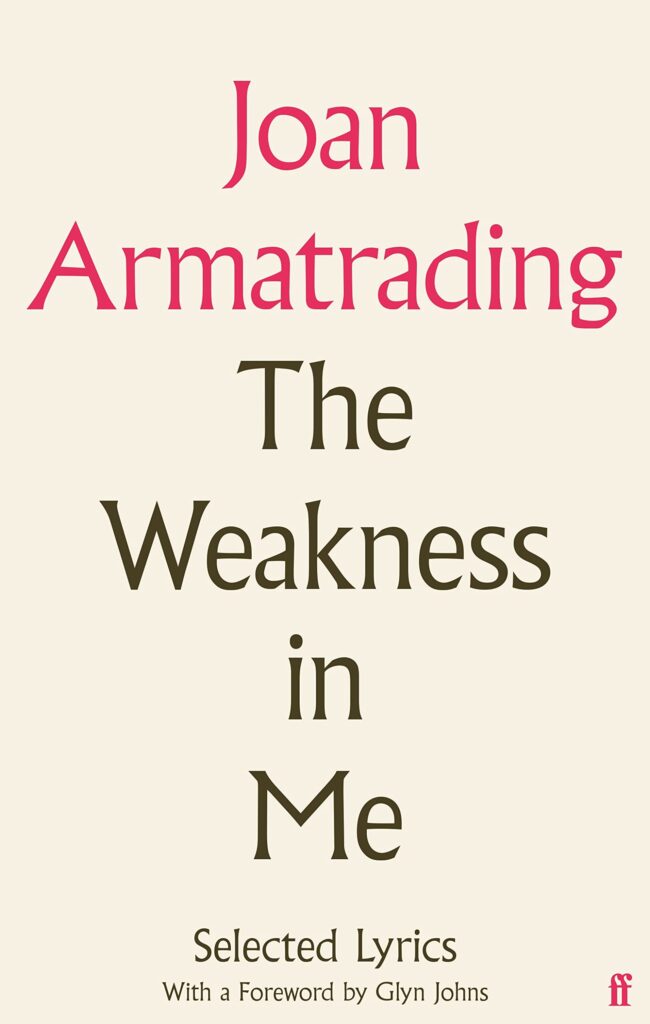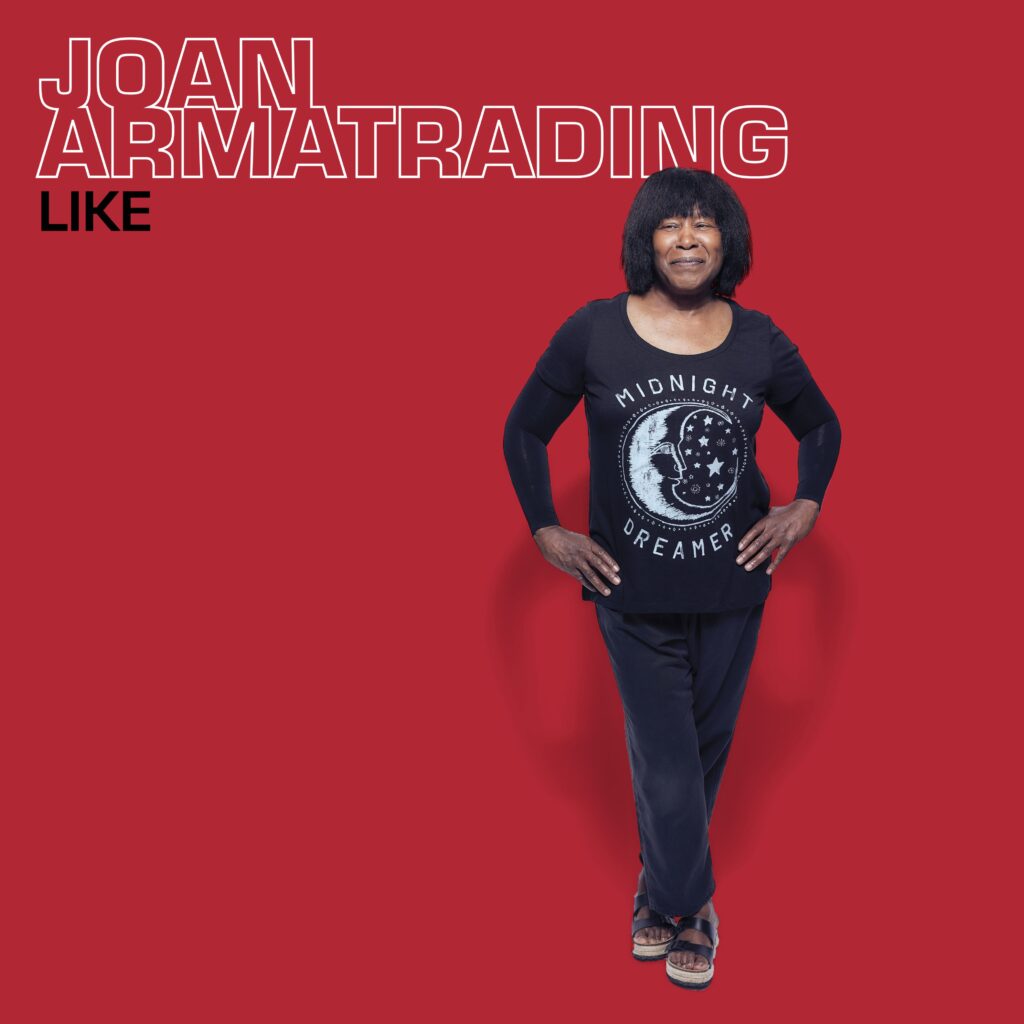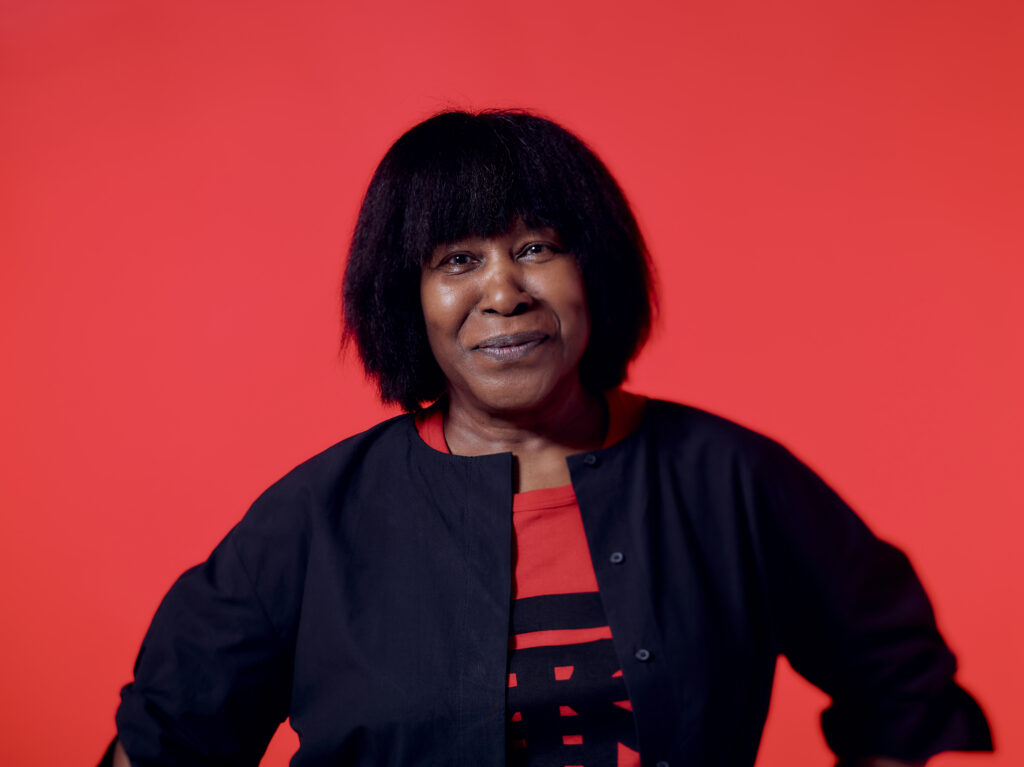Celebrating 50 years of Joan Armatrading and her new book, The Weakness In Me
Selected and arranged by the author, The Weakness In Me presents the lyrics of Joan Armatrading for the first time in one unique volume. The book is out now, and to celebrate this book we take a look back at her 50-year-career in an interview with Armatrading herself.
Since the release of her debut album Whatever’s For Us in 1972, Joan Armatrading has built a stunning musical body of work and since that time has been acknowledged as the first British female singer-songwriter to gain mainstream international success. With her poignant, piercing lyrics, embodied in the indelible song “The Weakness In Me,” she opened a sonic world of emotional intelligence and empathy.

Selected and arranged by the author, and featuring a foreword by revered record producer Glyn Johns, The Weakness In Me presents the lyrics of Armatrading for the first time in one unique volume. It also contains an introduction by Armatrading alongside annotations to a number of songs, giving a rare, personal glimpse into the creative process of a true pioneer.
To celebrate the release of the new book, please enjoy our feature interview with Aramatrading.
When her debut album, Whatever’s For Us, came out in 1972, there was really no one else like Armatrading on the scene. True, there were plenty of singer-songwriters in the early 1970s. And there were Black women in pop music during that era. But there were few, if any, Black female singer-songwriters at the time — let alone one who was just as comfortable writing thoughtful folk songs as she was unleashing a guitar solo that could be the envy of Pete Townshend. Armatrading was a true anomaly who, in the States at least, never really got her due.
That’s not to say that Armatrading is a cult artist. In the UK — where she has spent most of her life — she has placed hit singles on the charts from time to time and played the Royal Albert Hall. She’s never been without a record deal and is currently signed to BMG. She’s won plenty of awards throughout the years and has influenced many other artists (just as there would be no Tori Amos without Kate Bush, there would arguably be no Tracy Chapman without Armatrading). And her fan base is both diverse and devoted, as anyone who has seen her perform knows.
Incredibly, 2022 marks half a century since Whatever’s For Us arrived. Armatrading wrote the songs on that first album with Pam Nestor, but subsequently wrote most (if not all) of her material alone. While she was somewhat less prolific in the ‘90s than she had been up to that point, the new millennium constituted a rebirth of sorts for Armatrading. The six albums she has released since 2003 have all been well received and each one has been different from the last one musically. Lovers Speak (released that year) was a critically acclaimed singer-songwriter affair that, as the title suggests, dealt primarily with matters of the heart. Into the Blues came out four years later and found Armatrading diving headlong into that genre — the first straight up blues disc she’d ever made. This Charming Life, a more rock-oriented album, arrived three years later and the jazz-infused Starlight came three years after that. In 2018, Armatrading resurfaced on the largely acoustic, more traditional Not Too Far Away. And that brings us to last summer, when she unveiled her 20th studio effort, Consequences.
While the subject matter on Consequences once again focuses mainly on romance and relationships, the sound is quite different from Not Too Far Away. This album is more upbeat and more keyboard driven. Highlights include the title track, the single “Already There,” the catchy “Better Life” (which has a hint of reggae) and the closing track, “To Anyone Who Will Listen.” That last song doesn’t sound like anything else on Consequences — it’s more downbeat and sparsely arranged — but it’s an interesting and effective way to end the record.
While The Advocate described Armatrading as a lesbian a few years back, she has never publicly addressed her orientation. But in this writer’s opinion, she has every right to keep that to herself; what matters most is the music. Having interviewed her several times now, I would also take issue with the notion that she is uptight and guarded. In my experience, she may be no-nonsense but she is also gracious and witty. This time around, we discussed everything from Consequences to the COVID pandemic to some of her older classics.
Before I ask you about Consequences — the world has obviously undergone a major change in the last year and a half. During the pandemic, what has life been like for you and what has it been like in rural England?
Joan: Well, in terms of work — for me, it’s been no different. The way I work now is the way I’ve worked over the years. I’m solitary; I do everything myself. I write things, I arrange it, I sing it, I play everything, I engineer. That’s how I did this album, that’s how I did the last album [and] the album before that. So it hasn’t made any difference to me [in that sense]. I started writing the album before the pandemic. You know, I was doing everything on my own. So all I did was continue to do what I’ve been doing for the past however many years. I was very lucky with that.
[But] in terms of what we’re all going through — well, we’re all going through it. (laughs) Whatever country you’re in, if [they] say “We’re having a lockdown,” then you’re having a lockdown. If you’re in a country that says “We’re not having a lockdown,” then you don’t have [one]. You just have to abide by whatever the guidelines are. So that’s what I did, same as everybody else.
Everybody was affected [by COVID]. Nobody was ahead of the game. I don’t think anybody was. Did you predict this before it happened?
No. But my predictions in the last few years have been wrong across the board. I predicted that Hillary Clinton was gonna destroy Donald Trump, so what do I know?
Joan: (Laughs) But this is a different prediction. You know, there’s loads of people who made that kind of prediction. But there wasn’t anybody who made this particular prediction. There were people who were saying that someday we’ll have a pandemic. But nobody said, “In 2020, we’re gonna [have one].” You can’t know something until you know it.
It was really unprecedented.
Joan: Absolutely. And it still is. It’s ongoing. It’s gonna be the end of 2021 [and] we’ll have had two years. ‘Cause it’s not gonna end tomorrow.
Well… The new album is Consequences. You said you started recording this even before the lockdown.
Joan: Yeah. I started it in January of 2020, I think. And delivered it to the record company by April.
It feels to me like a pretty happy album. I wanted to ask you about two of the songs. First, tell me about the title track. Anything you can tell me about “Consequences” and maybe why you chose it [as] the title track.
Joan: Well, I’m always talking about consequences. [There’s an] example that I always use and I’m gonna use it again. You’re gonna make a cup of tea. You get the cup, put the teabag in it, put it in hot water. Then you go and get the milk. You start to pour the milk [but] now you’ve dropped the milk. And the milk is all over the floor. Now you’ve got a puddle [that] you’ve got to clean up. You’ve got a carton. You’ve still got to mop up all the milk that’s spilled. Then you try and go and get another [carton of] milk and realize that you haven’t got another one. So now you’ve got to go to the shop. On the way to the shop, you might have an accident. Something else is gonna happen.
So the consequences of trying to make a cup of tea have turned into a great big drama. And that’s life. You do an action, you have a reaction. Pretty much everything you do, there’s a consequence. And that’s what this song is about. [If you’re in] a relationship, the other person needs to think about what they’re saying and doing. Because the consequence of that is why they’re staying together. It’s not about me, by the way. But… You’ve gotta think about what you’re doing.
And the pandemic is a consequence!

Oh yeah! And very much a ripple effect. Not unlike the cup of tea analogy. By the way, I’m gonna use that story as a way to justify my continuing to drink coffee. (laughter) What can you tell me about the closing track, “To Anyone Who’s Listening?” It’s lovely [but] seems a little more pensive than most of the album. It’s a nice way to end it.
Joan: I was reading an article. And this chap was going through a kind of depression. What he was saying was that he just wanted people to listen to him. He wasn’t looking for advice. He wasn’t looking for people to tell him, “This is how you turn your life around.” All he wanted somebody to do was just listen to him explain how he felt. And I don’t know; I just really felt it! I really felt what he was trying to say. So I wrote the song.
Let me go back in time a bit. I believe you turned 70 [recently].
Joan: Yes. I turned 70 in December [of 2020].
You’ve released 20 studio albums now [as well as] live albums. You’ve toured the world. You’ve gotten to know Nelson Mandela. You’ve gotten awards. What would you say is on your bucket list that you would still like to do that you haven’t done?
Joan: I never talk about what I want to do. I like to just try and do what I want. You know, when I did my degree — which I did over five years [while] I was on tour — I never told anybody. I didn’t tell friends, I didn’t tell family. The people I was touring [with] knew, because we were together. (laughs) But I didn’t tell anybody [else]. You wouldn’t have seen it written in the paper. I like to try and do stuff and, once I’ve done it, I can say “This is what I’ve done.” So my bucket list, if I have one, is a secret.
Fair enough. In the last 30 [or 40] years, how has the role of women in music changed, for better or for worse?
Joan: I get asked that question quite a lot… The role of women has always been important. And women’s involvement in whatever area of the world you wanna talk about [has] always been there. Not necessarily getting the press to let you know that [they are] there. So I think the same thing happens in music. Women have always been involved in music, and as each [genre] emerges then women’s involvement becomes more prominent. If you’re talking about, say, rock and roll – at the beginning, [it] was an emerging thing. And quite often, emerging things are very male-dominated. But women soon join in. And [if] you talk about folk, same thing. So it’s not that women aren’t there; it’s just that the way of the world is to highlight the men’s achievements.
For instance, if you talk about me—when I started, I didn’t know of another woman writing the [kind of] songs I was writing and playing the way I was playing. But that’s all that is. Because today there are lots of women doing all kinds of different things. D’you know what I mean? So it’s not anything particularly special; it’s just that it was an emerging thing.
Can I ask you about one older song, which is probably my favourite song of yours? “The Weakness in Me.”
Joan: It’s [about a] person who’s… I don’t know if they’re having an affair. But they’re in love with two people. They have strong feelings for both of [them] and can’t figure out a way of giving up one of them. You very often — I mean, I’ve known people in that situation! I’ve seen how it’s kind of gone for one of them. And I’m probably romanticizing it more than what I’ve witnessed. It’s hard for people when they’re in that situation. It seems hard to give up the thing that you probably know you should give up. So the song is kind of expressing that.
I’ve had people say to me that they’ve used that at their wedding. And that may be a bit — I’m not sure that it’s a wedding song! But I suppose it says, “the weakness in me,” which is quite nice.
[One of] my good friends — her wedding song was “Love and Affection.”
Joan: Oh, that’s nice! That’s the right wedding song! (laughter) I love that song as well. You know, I don’t know whether I should say [this] but I love the words to that. I really like the words to “Love and Affection.” I love the words to “Consequences” and I love the words to “Already There.”
The way I wrote this album and the last album, Not Too Far Away — [for] both of these albums, I wrote all the words first. No music at all. Didn’t even think of the music. And then once I’d written all of the words to all of the songs, I started to work on the music. Which is different to how I worked up until Not Too Far Away. I would generally write whatever came. I would write the words first, the music first, both together… I was used to playing my songs myself on my demos. 2003 was when I decided I would play everything myself. And from then on, that’s kinda what I’ve been doing — apart from getting someone to play the drums. But then I decided that I could program the drums myself. I”m not gonna play drums; I don’t think I’m good enough to play on my records! (laughs) I will one day! But I decided I would program the drums. That’s what I’ve been doing fo the last however many albums — just programming the drums myself. So literally, it’s just me on the record.
That’s what I thought. It also seemed like there were a few albums where you kind of stuck to one musical genre. Like Into the Blues. And I think the next time I talked to you, This Charming Life had just come out, which was more of a pop-rock album.
Joan: That’s right. And for those, I purposely set out to write a trilogy of blues/rock/jazz. So Into the Blues [was] sticking only to blues. This Charming Life sticking only to rock. And Starlight sticking only to jazz. So [with] the next one, I thought it would be really nice if I did a more acoustic-sounding album. That’s why Not Too Far Away has the more acoustic sound. [On] this one, I thought it would be really nice to have more keyboards.
I guess that’s [like] not having a bucket list. It keeps it interesting [and] spontaneous.
Joan: Absolutely.
Well, listen, Joan. As always, I enjoy talking to you and appreciate your time.
Joan: Thank you. I appreciate you liking my music.
Of course! And I appreciate my friends, the Johnsons, who turned me on to your music when I was younger.
Joan: Thank you, the Johnsons! (laughs).
For more information visit Joan here.






